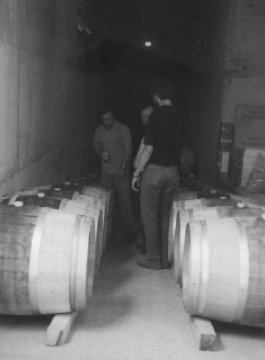A Foray into the Mystique of Chile’s Wine Industry
Local Culture and International Commerce

Chilean wine country. Photo by June Caroline Erlick.
In the fall of my junior year, I sat down with the undergraduate advisor at the David Rockefeller Center for Latin American Studies and announced that I would be taking myself to Chile. I needed help dreaming up an internship suitable for a Russian Literature major interested in learning about international business, something more cultural than numerical. The answer I received was simple and immediate: you should work at a vineyard. There was no hesitation on my part; I knew we had found the perfect solution, an industry that would be particularly pertinent to Chile, profoundly cultural and also extensively international. A few months later, thanks to the assistance of the DRCLAS Regional Office in Santiago, I was offered a job in the export department of Viña Bisquertt Ltda.
Vina Bisquertt, known for its Casa La Joya wine, runs its operations out of an old colonial house in Providencia, Santiago. Its comfortable office space maintains an appropriately homey quality. After all, the wine business is most often a family affair. Don Osvaldo, the owner and family patriarch, worked downstairs and staffed much of the office with his own sons and daughters. The grapes were grown on the Bisquertt family’s hereditary estate in the Colchagua Valley, three hours south of Santiago. Leisurely lunches of familiar, home-cooked Chilean traditions, like cazuela chilena and pollo arvejado, coupled with a workspace crafted out of former living quarters, made for a remarkably close-knit staff with an intimate sense of family and community.
However, the Chilean culture infiltrates the industry long before one arrives at the main office. Back in the Colchagua Valley, one of Chile’s most prestigious wine-producing regions, the essence of the land and the culture first make their mark. On a weekend trip to the Festival de la Vendimia, the annual celebration of the grape harvest, I witnessed first hand the magical influence of the traditional Chilean countryside on the wine industry. Chileans traveled from all over the region to sample the new wines and to cheer on the participating winners of the cueca contest who were awarded the privilege to go on stage and stomp the grapes. Here, not only the culture, but the land itself endows the wine with a quality particular only to Chile, whose unusually elongated geography makes possible the region’s ideal grape-growing terrain, perfectly embedded between the Pacific Ocean and the Andes mountains.
Having turned inward to infuse the wine with these highly localized influences—Chilean geography, the countryside and its traditions, and the patriarchal, family-centered business practices—the product is now focused in an outbound direction, ready to compete on the world market. Here is where my internship picked up the process, assisting in the search for importers and distributors in the Americas and Asia. I researched the wine market in countries as far away as China, Korea and Indonesia. In exploring potential clients, I often investigated which dealers had already shown an interest in Argentine wine, sometimes a competitor, but often the indication of a more general interest in South American products. When speaking with contacts in Asian embassies, I learned of the vast extent to which the wine’s high esteem has spread. Chilean vineyards such as Viña Bisquertt have succeeded in seizing worldwide attention because of their high quality, award-winning wines and affordable prices. In fact, Viña Bisquertt’s 2000 La Joya Merlot was actually awarded Best Merlot of the World by the London International Wine and Spirit Competition. The industry’s reputation only continues to garner ever more accolades. It came as little surprise, therefore, when that summer, even while working on the other side of the globe in Moscow, Russia, I walked into the local grocery store only to discover a great big showcase, featuring none other than the exotic and marvelous wines of Chile.
Spring 2004, Volume III, Number 3
Richard Freeman is a senior at Harvard College, concentrating in Russian Literature and Culture. He thanks the DRCLAS regional office, which made possible this unique internship experience. Richard can be reached at freeman2@fas.harvard.edu and welcomes any questions or comments.
Related Articles
Poverty or Potential?
Teresa stops me three blocks from Nueva Imperial’s main plaza on a quiet Wednesday morning, eager to chat. She is wearing a light blue sweater and a matching blue headband glowing slightly against her dark black hair.
Editor’s Letter: Chile
I was hesitant to do an issue on Chile when I had other topics broader and richer in content. Although in a way Chile seems like an obvious choice because of the DRCLAS Regional office there, I felt there were other priorities in terms of substance.
Three Students, Three Experiences
I was extremely impressed with how successful the Chilean health system has been in improving the health of its citizens despite its limited resources. Its success, however, in many…




